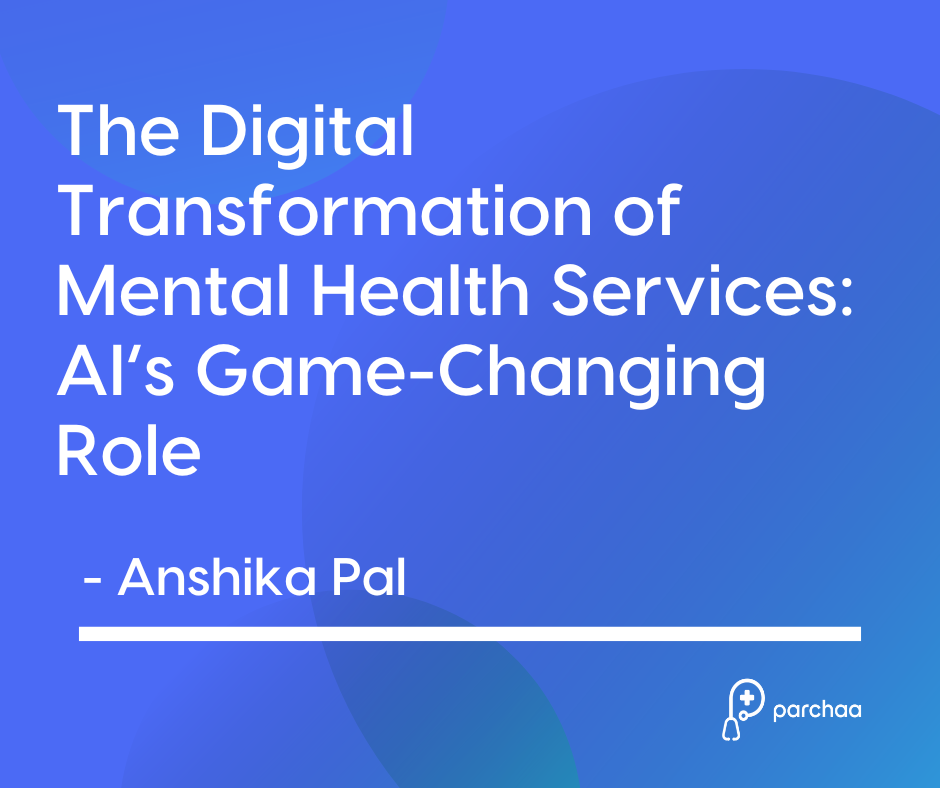Contact Us
If you have any questions, feedback, or need assistance, our dedicated support team is here to help.

The Growing Mental Health Crisis and the Urgent Need for Innovation
Mental health disorders affect millions globally and represent one of the fastest growing public health challenges. In India, nearly 150 million people require mental health support, but access to quality care remains severely limited because of scarcity of specialists, social stigma, and geographic barriers. Traditional mental health services struggle to meet increasing demand, often resulting in long wait times and inadequate care. The COVID-19 pandemic further underscored these challenges and accelerated the adoption of digital solutions.
The digital transformation of mental health powered by artificial intelligence represents more than just technology advancement. It is a fundamental reimagining of care delivery that has the potential to expand access, increase personalization, and improve clinical effectiveness at scale while preserving human empathy.
How AI Is Revolutionizing Mental Health Care
AI technologies are contributing to the transformation of mental healthcare in several ways:
AI Chatbots and Virtual Therapists
Advances in natural language processing enable AI chatbots and virtual therapists to deliver evidence-based therapies such as cognitive behavioral therapy around the clock. Platforms such as Woebot and Wysa have demonstrated effectiveness in reducing symptoms of depression and anxiety. They provide confidential, stigma-free support, accessible anytime and anywhere, overcoming barriers related to cost and limited provider availability.
Personalized Monitoring and Early Intervention
AI algorithms analyze data from wearables, smartphone usage, digital assessments, and self-reports to identify early warning signs of mental disorder onset or relapse. This enables proactive clinical interventions, improving adherence, tailoring treatments, and optimizing outcomes.
Expanding Reach to Underserved Populations
Telepsychiatry and AI-powered mobile apps help bring mental health services to rural and resource-poor areas where specialist care is scarce. AI tools assist in remote triaging, prioritizing severe cases, and extending clinician capacity.
Supporting Healthcare Providers
AI augments mental health professionals by streamlining documentation, risk identification, and treatment management, helping reduce burnout and improve the quality of care delivery.
Addressing Ethical and Practical Challenges
While AI offers great promise, several concerns must be carefully managed:
- Ensuring stringent data privacy and security safeguards is critical because mental health data is extremely sensitive.
- AI systems could perpetuate bias or inaccuracies if trained on non-representative data. Ongoing audits and diverse training datasets are essential.
- AI should augment, not replace, the role of human clinicians who provide nuanced diagnosis, empathy, and crisis intervention.
- Building trust requires transparency, culturally sensitive design, and clear, open communication about AI’s role and limitations.
Parchaa’s Unique Contribution to AI-Driven Mental Health Care
Parchaa, India’s digital medical companion platform, integrates AI-powered mental health modules designed specifically for India’s cultural and linguistic diversity:
- It offers multilingual, culturally relevant mental health support which improves accessibility and engagement.
- Patient-centered data consent frameworks empower users to control their own information, cultivating confidence in AI support.
- Parchaa’s AI-enhanced clinical decision tools assist providers while respecting their central role in care decisions.
- The platform combines telepsychiatry with AI chatbot support for continuous, scalable mental health care across urban and rural contexts.
- Regular feedback from patients, clinicians, and community health workers drives continuous refinement, ensuring practical relevance.
The Future: Blending AI Innovation with Human Empathy
The optimal mental health care model integrates AI’s efficiency in monitoring, triaging, and supporting patients with human clinical judgment and empathy. This hybrid approach enables broader access, improved treatment personalization, and better health outcomes.
Success depends on collaboration among technologists, healthcare providers, policymakers, and users to build systems that are ethical, trustworthy, and contextually appropriate.
Conclusion: Unlocking AI’s Potential to Transform Mental Health Care
AI-powered digital transformation can revolutionize mental health services by improving access, personalization, and clinical insight, particularly in resource-limited settings. Platforms like Parchaa show that combining innovative technology, cultural sensitivity, and clinician collaboration creates scalable, trusted solutions. Health leaders and innovators must support and adopt patient-focused, ethically governed AI platforms such as Parchaa. Doing so will enable scalable mental healthcare that respects privacy, embraces cultural diversity, and enhances human connection for improved mental well-being worldwide.



